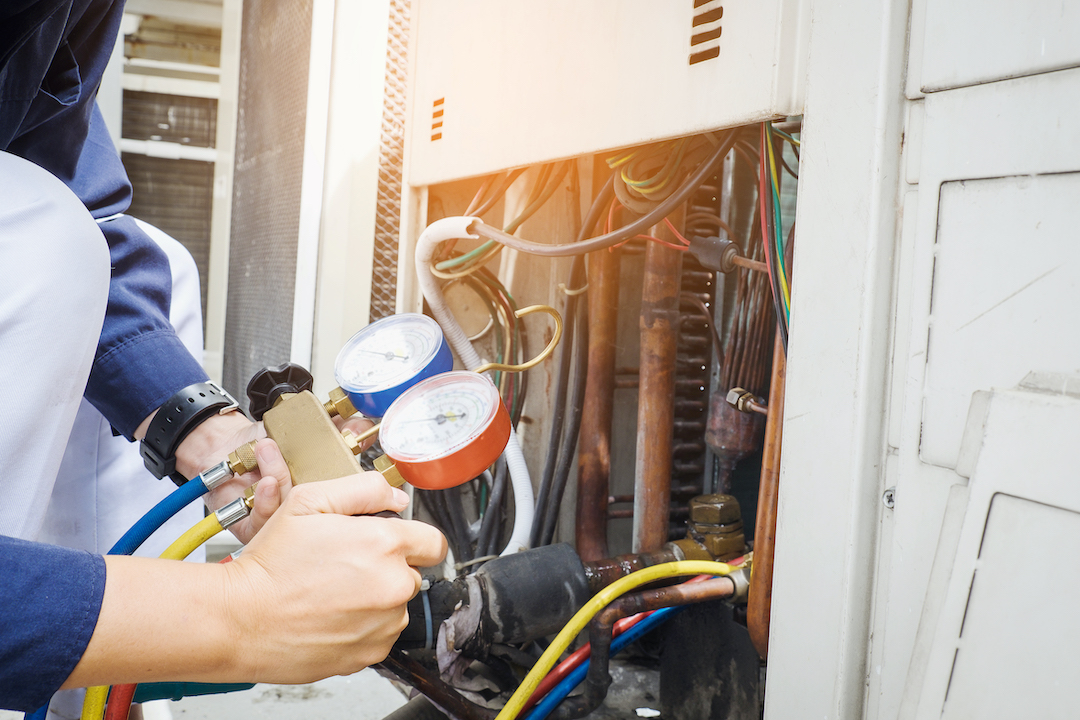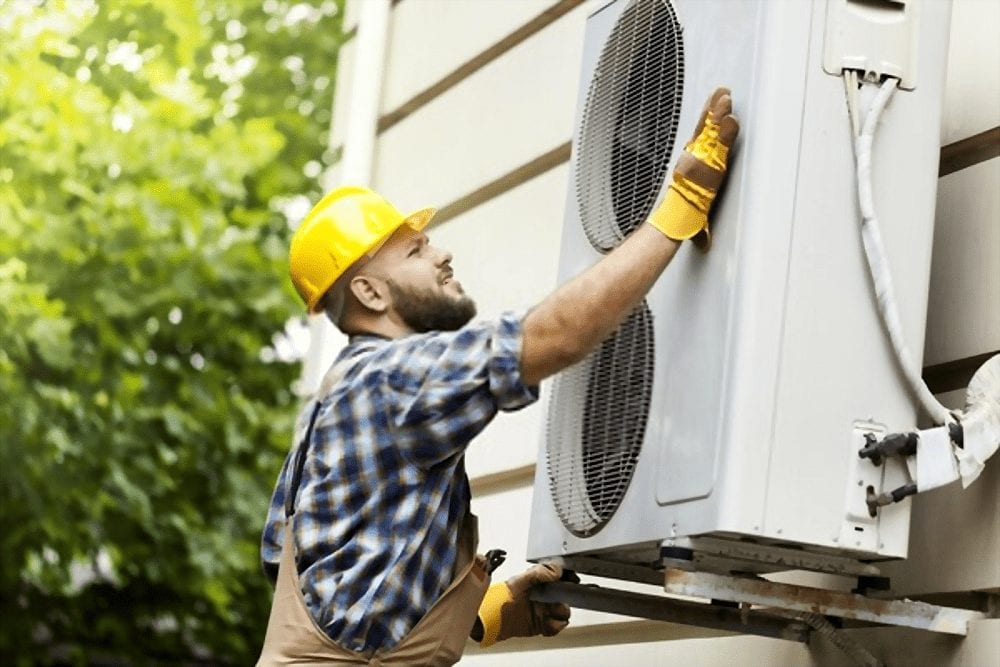Picking In Between a Heatpump and Heating System: Trick Considerations for Your HVAC Demands
When reviewing home heating alternatives for heating and cooling requires, the choice in between a warmth pump and a furnace can be complicated. Each system uses distinctive advantages customized to specific environments and energy efficiency objectives. Understanding these distinctions is vital for making an informed choice. Key factors such as setup prices and ecological effect even more complicate the choice procedure. Which option genuinely lines up with one's comfort and sustainability preferences? The following sections will certainly check out these factors to consider thoroughly.
Understanding Warmth Pumps: Exactly How They Work and Their Benefits
While numerous house owners take into consideration different heating alternatives, comprehending exactly how heatpump function and their advantages can greatly influence their decision. Heat pumps run by moving warmth instead than producing it. In the winter, they draw out heat from the outside air or ground and transfer it inside, while in the summer, they reverse this process, cooling the home by removing heat outside. This twin functionality makes them flexible for year-round climate control.One of the main benefits of heatpump is their power effectiveness. They utilize substantially less electricity compared to typical heater, potentially resulting in reduced energy bills (heat pump service). Additionally, heatpump have a smaller carbon footprint, making them an eco friendly selection. They also call for much less upkeep than standard systems, adding to long-lasting cost savings. On the whole, comprehending the mechanics and benefits of heatpump can aid homeowners make educated decisions regarding their heating and cooling requirements
Checking Out Furnaces: Kinds, Operation, and Advantages
Heating systems are available in numerous kinds, including gas, electric, and oil designs, each with distinct operational systems. Understanding these distinctions is necessary, as they influence efficiency and home heating efficiency. In addition, furnaces use various advantages, such as consistent heat outcome and dependability in cooler climates.
Sorts of Heaters
Heater can differ considerably in layout and procedure, with furnaces being a prominent selection amongst home owners. There are numerous kinds of furnaces, each utilizing various gas resources and innovations. Gas heating systems are usual, leveraging gas to create heat effectively. Electric heaters, on the other hand, use electrical resistance to generate warmth, typically favored for their uncomplicated installment. Oil heating systems, while much less usual, are reliable in areas with limited gas gain access to (ductless mini splits). Furthermore, condensing heating systems optimize energy performance by capturing and reusing exhaust gases. Each kind runs through a system of warm exchangers and ductwork to disperse warm air throughout a home. Understanding the distinctions between these heater types is important for notified a/c choices
Advantages of Heaters
For home owners seeking reputable heat during cool months, the benefits of furnaces are considerable. Heaters offer regular heating, ensuring even temperatures throughout the home. They are particularly reliable in extreme chilly, usually outmatching warm pumps in cold problems. Different types, consisting of gas, electric, and oil heating systems, supply flexibility to satisfy varied needs and preferences.Furnaces additionally often tend to have reduced first installment prices contrasted to warmth pumps, making them a more available choice for several. Their durable layout adds to a much longer life-span, with several devices lasting over 15 years with proper upkeep. Furthermore, contemporary heating systems are frequently outfitted with innovative technology for improved performance, which can result in decreased power expenses. In general, heaters stay a trustworthy selection for reliable home heating.

Power Performance: Comparing Warmth Pumps and Furnaces
When contrasting energy efficiency between heatpump and furnaces, the Seasonal Energy Effectiveness Proportion (SEER) plays an important duty in determining performance. Additionally, a functional price evaluation exposes the long-term economic effects of each system. Understanding these factors can assist home owners in making informed decisions concerning their heating services.
Seasonal Power Efficiency Ratio
Power performance plays a vital role in the decision-making process between heatpump and furnaces, particularly when considering the Seasonal Power Effectiveness Proportion (SEER) This statistics actions the cooling efficiency of warm pumps over an entire cooling period, giving a standard means to evaluate efficiency. Greater SEER scores show better power effectiveness, converting to reduced energy consumption and minimized energy expenses. In contrast, furnaces are usually examined utilizing the Annual Fuel Use Effectiveness (AFUE) score, which reflects heating performance. When contrasting these two systems, homeowners must focus on SEER scores for heat pumps, as they directly effect general energy financial savings and ecological sustainability. An extensive understanding of SEER can significantly affect the long-lasting fulfillment and cost-effectiveness of the chosen HVAC solution.
Functional Price Evaluation
Understanding the functional expenses related to heatpump and heaters is vital for home owners examining their choices. Heat pumps commonly provide higher power effectiveness, transforming electric energy into warmth with minimal waste. This causes lower month-to-month utility bills, particularly in modest climates. On the other hand, typical heaters, especially gas models, might have reduced in advance costs however can sustain greater operational expenditures in time as a result of fuel prices and effectiveness ratings.Moreover, warmth pumps can operate as both heating and cooling down systems, potentially reducing the requirement for different cooling and heating devices. While initial financial investments for heatpump might be higher, their long-term savings in power effectiveness can make them a more affordable selection for numerous homes. Mindful evaluation of local energy prices is important to establish the ideal alternative.
Setup Expenses: What to Anticipate for Each Home Heating System
Setup expenses for home heating systems can differ considerably between heatpump and heaters, affecting homeowners' decisions. Heat pumps typically have greater in advance setup prices, typically ranging from $3,500 to $8,000, depending on the my review here system dimension and complexity of setup. This consists of the outdoor unit, interior handling system, and essential ductwork modifications. Alternatively, heaters tend to have lower initial costs, balancing between $2,500 and $6,000, which can be appealing for budget-conscious homeowners. Installation costs can enhance if extensive ductwork is required.Moreover, the option of gas type for furnaces-- all-natural gas, lp, or electric-- can additionally influence setup prices. While warm pumps supply power efficiency, their first financial investment might prevent some buyers. Ultimately, examining installment prices alongside long-term cost savings and efficiency will aid home owners in making notified decisions about their furnace.
Climate Considerations: Which System Does Much Better in Your Area
Exactly how do climate conditions affect the performance of heater? The performance of warmth pumps and furnaces can differ substantially depending upon the neighborhood climate. In modest environments, heatpump succeed by effectively moving heat from the outside air, making them an energy-saving alternative. Their efficiency reduces in extremely cold temperatures, where they might struggle to extract sufficient warm. Conversely, heating systems, especially gas designs, give reputable and regular warm no matter exterior conditions, making them preferable in colder regions.In locations that experience milder winters, heat pumps can run effectively year-round, supplying both cooling and heating. In contrast, regions with rough wintertimes commonly gain from the robustness of heating systems. Ultimately, understanding the regional environment is necessary when determining between a warm pump and a furnace, as it directly affects their operational performance and overall performance.
Upkeep Demands: Long-Term Look After Warmth Pumps vs. Furnaces
While both warm pumps and heating systems call for routine upkeep to ensure peak performance, their details requirements and care routines vary significantly. Furnaces typically require less constant interest, with annual examinations sufficing to look for gas leakages, clean filters, and analyze overall functionality. Their simpler style frequently allows for straightforward repairs.In contrast, warmth pumps demand semiannual upkeep because of their twin role in heating & cooling. This includes cleaning coils, inspecting cooling agent levels, and guaranteeing that both the indoor and outside devices function at their finest. In addition, heatpump upkeep frequently entails even more elaborate elements, making specialist servicing essential.Neglecting maintenance can bring about decreased effectiveness and boosted energy costs for both systems. Eventually, useful source home owners should think about these lasting treatment needs when selecting between a heatpump and a heater, as positive maintenance can expand the life expectancy and efficiency of either system significantly.
Environmental Effect: Selecting a Lasting Home Heating Alternative
The environmental effect of home heating systems is an essential evaluation for house owners looking for sustainable options. Warm pumps are generally a lot more energy-efficient than conventional furnaces, as they move warmth as opposed to generate it, significantly minimizing carbon discharges. By using renewable resource sources, such as air-source or geothermal heat pumps, property owners can further reduce their eco-friendly footprint.On the various other hand, gas heating systems release greenhouse check my site gases and add to air pollution, though they typically supply greater warm outcome. However, advancements in innovation have brought about the growth of high-efficiency furnaces that minimize emissions.Ultimately, picking a furnace entails considering effectiveness versus ecological influence. Homeowners are urged to review regional energy resources and incentives for eco-friendly systems, guaranteeing an option that straightens with both individual comfort and environmental responsibility. The choice impacts not just prompt comfort but likewise long-term sustainability and environmental wellness.
Often Asked Questions
The Length Of Time Do Warm Pumps and Furnaces Generally Last?
The life-span of heatpump commonly ranges from 15 to twenty years, while furnaces can last between 15 to 30 years. Normal upkeep substantially influences their long life and effectiveness in supplying heating services.
Can I Make Use Of a Heatpump in Incredibly Cold Climates?
Heatpump can operate in incredibly chilly climates, but their effectiveness reduces as temperatures decrease. In such conditions, supplementary home heating sources may be essential to keep comfortable indoor temperatures and ensure peak performance.

What Is the Noise Degree of Warm Pumps Versus Furnaces?
The sound degrees of heat pumps and heaters differ considerably. Typically, warm pumps run even more quietly than traditional furnaces, making them better for those delicate to sound, while furnaces might create louder functional sounds throughout home heating cycles.
Are Warmth Pumps Suitable for Both Home Heating and Cooling?
Heat pumps are certainly ideal for both heating and cooling (furnace replacement). They function by transferring heat, supplying efficient temperature level control year-round, making them a versatile option for home owners seeking an all-in-one cooling and heating service
What Size Heating Unit Do I Required for My Home?
Figuring out the ideal size heating unit for a home requires assessing elements such as square video footage, insulation top quality, local climate, and the home's format. Consulting an expert can ensure an exact assessment and suitable convenience. Warmth pumps normally supply higher energy efficiency, converting electrical power right into warmth with very little waste. In modest environments, heat pumps succeed by efficiently moving heat from the outdoors air, making them an energy-saving option. On the other hand, heating systems, specifically gas models, give consistent and trustworthy warmth regardless of outside conditions, making them more suitable in chillier regions.In locations that experience milder winters months, warmth pumps can run properly year-round, supplying both home heating and cooling. Warm pumps are usually more energy-efficient than traditional furnaces, as they transfer heat instead than produce it, substantially minimizing carbon exhausts. By utilizing renewable energy sources, such as geothermal or air-source heat pumps, property owners can additionally lessen their ecological footprint.On the various other hand, all-natural gas furnaces give off greenhouse gases and add to air contamination, though they usually provide greater warmth outcome.